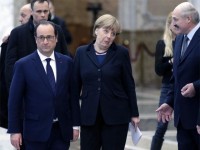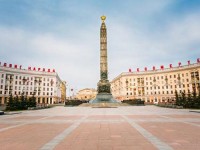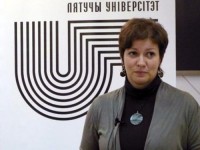We present a collection of articles “Civil society in Belarus 2015-2021: from stable development to new challenges”.
A usual circle. No sanctions, no changes

After the abolition of the sanctions, the EU and Minsk will further expect from each other for the steps that no one is going to take. The situation in the country will not change; only the third force can affect it. If the Belarusan civil society doesn’t become this third force, then Russia will become it.
On Monday, February 15, the EU abolished most of the restrictive measures against Belarus. Although, technically the sanctions remained in force — it’s just a number of them that has reduced to minimum. 170 people, and three Belarusan companies have been liberated from the restrictive measures. At the same time, four people have remained on the list of visa and economic sanctions on suspicion of involvement in the disappearances of politicians, and a journalist in the years 1999-2000. The embargo on arms supplies to Belarus has also been saved.
The EU's decision is primarily political in nature, it practically does not bind to the overall situation in human rights, except for two facts: political prisoners and mass repressions. The EU thus recognizes that the Belarusan human rights situation has not improved, and it traditionally calls for action to change it.
The reasoning part of the decision concerns only the actions of the Belarusan authorities for cooperation with the EU in recent years, including the resumption of a human rights dialogue. Thereby, the ground is the improvement of relations between the authorities of Belarus and the European Union, rather than actually changing the situation in Belarus itself.
Besides, the EU Council refers to “the constructive role of Belarus in the region.” It is not difficult to guess that in this case the matter concerns the role of Belarus in the Russian-Ukrainian conflict. And here, we can congratulate the whole chorus of pro-government and independent analysts echoing them in Belarus and abroad, working on the promotion of a supposedly neutral role of Belarus in the conflict. They have been boosting with all their strength the significance of a mythical peacekeeping role of the official Minsk in the conflict, including creation of the illusion of the incredible Russia’s pressure on Belarus on this issue.
The virtual reality of a proactive role of Belarus in the region has been created; the tougher will be to face the actual reality, when it will manifest clearly.
Herewith, the sanctions are not the most important issue of the European-Belarusan relations. And, in reality, they never were. The EU restrictive measures, in the form in which they have long existed, are a purely symbolic thing, and as any symbol, they are supported by energy of belief in them.
The belief of some people in the positive impact force of sanctions on the Belarusan regime, and the belief of other people in a positive effect of their absence on the development of cooperation have been adding fuel to the flames of hot debates. Now we will hear for some time, on the one hand, condemnations of a “cynical” EU's position, and on the other — moans of joy. But, when everybody cools off, it will turn out that nothing has changed, in fact.
The European Union have had the right to impose sanctions, in response to the massive repressions after the 2010 elections, and the emergence of political prisoners in Belarus. The European Union have had the right to cancel the majority of sanctions in response to the absence of mass repressions, and the release of political prisoners before and after the October 2015 elections.
The real forms of cooperation between the Belarusan authorities and the EU have begun to emerge from the end of 2013 — with the resumption of diplomatic dialogue, negotiations on simplification of visa regime, continuation of the sectoral dialogues, and discussions on the issues of modernization, expansion of the technical assistance projects. The sanctions were not an obstacle to that.
The whole course of the development of the last two years’ relations has been dictating that the sanctions were to be frozen immediately after the liberation of political prisoners; and that was done. After the sanctions’ “freezing”, their lifting did also become a matter of the nearest future, although I did not expect that this prospect will be so short.
Lifting most of the sanctions will have little impact on the acceleration of any processes of cooperation, as they have their own logic. For example, due to the lifting of sanctions, the process of signing a bilateral agreement between the EU and Belarus is unlikely to be accelerated. The obstacles with biometric passports in the negotiations on visa facilitation will not disappear, as well.
The easing of the EU sanctions’ regime will have a certain sense for international financial institutions — in particular, for the European Bank for Reconstruction and Development, which is likely to expand its program for Belarus. The same applies to the European Investment Bank, to a lesser extent, though, to the IMF. This way, these resources will not be critical to help solving the economic problems of Belarus.
Certainly, with such a symbolic step the EU grants a big advance (one might say, too bid) to the Belarusan authorities, counting on the fact that the latter will perceive it as a call to action. Still, it is unlikely these hopes will come true.
The official Minsk feels itself the safe winner in this situation, and it will not be in a hurry with any specific actions. It will wait for the money, but they are unlikely to be paid off; at least, in the amounts, which the Minsk authorities count on. The EU would like to assist in the reforms — but when there are no reforms, and they are hardly to be expected, what can one do?!
It would be good if the EU considered a decision on sanctions as a step in the unfolding of its own policy with regard to Belarus, without considering (as much as possible) what and how will the Belarusan authorities do. In this sense, it would be possible to rely on the use of temporary warming to expand the presence of the EU in various spheres of Belarusan life. For example, through increased co-operation programs with the involvement of the maximum number of actors within the country: private businesses, educational institutions, and civil society in the broadest sense. Yet, such a positive opportunism is not typical for the European Union's policy.
Altogether, both the EU and the Belarusan authorities are likely to expect from each other actions, which the other party is not going to perform. In the prospect of one and a half, or two years, it could lead to a repetition of a traditional vicious circle: repressions — sanctions — freezing relations.
As before, to prevent such a scenario could be the emergence of a third force on the Belarusan political scene. And if this force isn’t a democratically oriented part of the Belarusan society, then Russia may take advantage of the situation.
Others
-
A usual circle. No sanctions, no changes
After the abolition of the sanctions, the EU and Minsk will further expect from each other for the steps that no one is going to take. The situation in the country will not change; only the third force can affect it. If the Belarusan civil society doesn’t become this third force, then Russia will become it.
-
Letter from Minsk
Strategic Europe continues the second phase of its Capitals Series exploring how EU foreign policy is viewed by six countries in Europe’s Eastern neighborhood. Carnegie Europe asked contributors from each capital to give a candid assessment of the EU’s policies toward their country, with a ranking on a scale from “miserable” to “excellent.” The spotlight is on Belarus.
-
The Year of Belarusan thinking in the Flying University
We publish the speech of Tatiana Vadalazhskaya, a coordinator of the Flying University, during the first session of the university seminar in the 2015-2016 academic year.
-
Academic non-freedoms
In order to join the Bologna process in practice, Belarus needs institutional structural changes.








Comments
Andrei Yahorau — Al Jazeera: “Lukashenko is irresponsible”
He said Belarus would likely face economic tightening not only as a result of the coronavirus pandemic but also a Russian trade oil crisis that worsened this past winter.